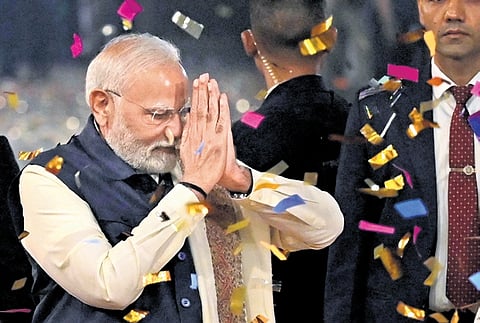

MUMBAI: The closely-fought Maharashtra assembly elections on Saturday decisively swung in favour of the BJP-led Mahayuti alliance, routing the Opposition Maha Vikas Aghadi that had gained a psychological advantage by its sterling performance in the Lok Sabha polls six months ago.
The BJP emerged the single largest party with 132 seats, surpassing its last two scores of 122 in 2014 and 105 in 2019. This is the peak BJP performance in Maharashtra with a strike rate of more than 85% — highest among all alliance partners as well as the Opposition.
Chief Minister Eknath Shinde’s Shiv Sena contested 79 seats and won 57, with a vote share of 12.38%. Shinde ensured that the MLAs who revolted along with him against Uddhav Thackeray’s leadership got elected. In contrast, the Uddhav-led Sena could manage just 20 seats.
Deputy Chief Minister Ajit Pawar-led NCP won 41 of the total 59 seats it contested with a 9.01% vote share as against Sharad Pawar’s NCP-SP getting 11.28% votes but only 10 seats.
As for the Congress, it had won 13 seats in the Lok Sabha polls but squandered the advantage within six months. It managed to pick up just 16 seats in the assembly polls despite contesting from 101 (12.24% vote share).
The debacle meant that for the first time in the history of the state assembly, there will be no the leader of Opposition. For, no Opposition party got even 10% of total strength of the 288 of the House.
As for the BJP, after the surprise victory in the Haryana polls, the party appears to have picked up momentum. Its welfare schemes like the Ladli Behna struck a chord, evidenced by high polling of women.
Local leaders and the RSS did the hard yards rather than big-time parachuting of national leaders to sway the electorate. In contrast, prominent Congress leaders like Rahul Gandhi were hardly visible on the ground in both Maharashtra and Jharkhand.